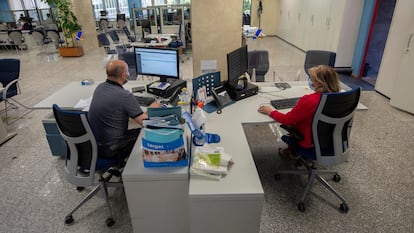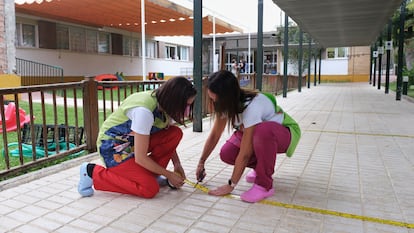Return to normal uncertain in Spain as Covid cases fall, vaccination advances and delta variant circulates
As students go back to school and staff to their offices, the coming weeks will be key for either relaxing coronavirus measures or maintaining them to combat new spikes

The return to work and to school this week in Spain got going subject to two forces that are pulling the epidemiological curve in two directions. The delta variant of the coronavirus, which is much more contagious than previous strains, is pulling it upward, having muscled in to account for practically all cases in the country this summer. Meanwhile, the vaccination campaign is pushing it down, thanks to more than 73% of the population now having the full protection offered by the shots, together with the natural immunity of those who have had Covid-19.
September began with the incidence of the virus falling, and according to Wednesday’s Health Ministry report, the 14-day cumulative number of coronavirus cases per 100,000 inhabitants is now at 150.3. This is just a few tenths of a point above the level considered high risk, according to the ministry’s criteria. What’s more, there are fewer and fewer coronavirus restrictions in place in the country’s regions.
For these measures to be lifted further, the effect of these two opposing forces will have to be monitored over the coming weeks, to see if the curve continues to fall or suffers a spike that will force the health authorities to put their foot on the brake when it comes to Covid-19 restrictions.
Given that the coronavirus has been a source of constant surprises, the new ingredients make the near future even less foreseeable. Herd immunity is now a situation that few experts believe will be possible, and they are inclined to think instead that we will be living with an endemic disease that will continue to cause suffering, but progressively less so, and that sooner rather than later we will have to learn to live with Covid-19
But there is still a way to go. Spanish Health Minister Carolina Darias does not support an approach similar to that in the United Kingdom, where Prime Minister Boris Johnson proclaimed June 19 “Freedom Day,” and practically all restrictions were lifted. She would prefer for the measures in place across the regions – which are in charge of their own restrictions – to be progressively cut back until they disappear.
After a meeting on Wednesday of the Inter-Territorial Council of the National Health System (CISNS), which brings together the central Health Ministry and the regions, Darias was prudent and called for the “culture of care” to continue in order to keep pushing down transmission levels and hospital occupation.
The coming weeks will be key for analyzing the situation. It will need to be seen whether the return to school and the office prompt a considerable spike in the virus – few are willing to predict what will happen. Right now, there are few other examples to look at. Several months ago, experts analyzed what was happening in other countries that were ahead of Spain with their vaccination campaigns. But now the country is among the leading nations in terms of percentage of population inoculated, meaning there are few other reference points in terms of what could come next.
“We don’t have a crystal ball, but for the first time I’m optimistic and I think that in the case of there being a sixth wave, it will be very mild, more like the fourth, which was the only one that we managed to control,” explained Elena Vanesa Martínez, the president of the Spanish Epidemiological Society, speaking from León, where the association is currently holding its yearly meeting.
Nearly all eyes right now are on schools. Last year, they were one of the big success stories in Spain when it came to managing the health crisis. Despite the fears of many experts, they did not become a source of contagion, and classes proceeded without too many setbacks while face-to-face teaching was the norm for the younger ages.
This September, the school year is starting with similar measures in place, such as obligatory masks for the over-sixes. But class sizes have now returned to what they were before the pandemic, meaning that students will be closer together. What’s more, the delta variant is now circulating widely in Spain.
Some epidemiologists trust that the success of 2020 can be repeated, while others fear that the new factors will, this time around, see schools become the main reservoir of the virus among a population that has not yet been vaccinated, given that no medication has yet been approved by the Spanish or European health authorities for the under-12s.
In this scenario, the classrooms could create a sixth wave that passes from younger ages to older, as happened with the fifth wave ahead of the summer, mainly caused by increased social interaction among unvaccinated youngsters at the end of the school term. Children could still pass on the virus to vaccinated adults, although the latter will have a much lower probability of getting seriously ill or dying.
Unless a new variant that is resistant to the vaccines emerges, something that can’t be ruled out, the expectation is that any new wave would have a much lesser effect in terms of hospitalizations and deaths. In the fifth wave, which began when just one in every five Spaniards was fully vaccinated, the death rate was seven times lower than in previous waves. In a sixth wave, when more than 70% of Spanish residents are fully vaccinated, the death rate should be even lower.

José Martínez Olmos, a teacher at the Andalusian School of Public Health, would have liked to have seen class sizes remain reduced, at least for a few months. He also believes that the experience of last year can be built on: isolating classes, masks, ventilation and hand washing. “That strategy will probably give us good results once more,” he said.
The return to the office worries him less. Both he and other public health experts consulted believe that this will have a lesser impact on the progress of the epidemic. “I don’t believe that we have to do anything special,” explained Alberto Infante, a teacher from the National Health School, “beyond insisting on ventilation, hygiene, personal control measures, the use of masks and hand washing.” The biggest problem, in his opinion, will be the under-30s due to “illegal parties and botellones [street drinking].”
A lot of companies that have, until now, kept home working in place will begin to call on their employees to return to the office over the coming weeks. That said, only 10% of staff are still working from home compared to 25% last year, according to Carlos Gutiérrez, from the CCOO labor union, who was cited in a business feature in EL PAÍS.
In order to calibrate the return to normality, the cumulative incidence will have to be monitored. That said, it is not an indicator that can now be read as it was before the vaccination campaign, given that the same number of infections causes much fewer hospitalizations and deaths, and the majority, thanks to the injections, are very mild or asymptomatic.
Fernando Rodríguez Artalejo, a professor of public health at Madrid’s Autonomous University, believes that it “probably doesn’t make sense” to still be talking about 25 to 50 cases per 100,000 inhabitants over 14 days as a time when we can return to normality – a target that was set many months ago by Spanish Prime Minister Pedro Sánchez. In his opinion, once the figure is below 100, “we can start to really open up.”
Among the half dozen experts consulted by EL PAÍS, Artalejo is the most inclined to eliminate restrictions. “The logical thing is for the positive trend to stay because this will comply with the rise in vaccination and the greater immunity among young people due to such high exposure,” he said. “But there can always be surprises.”
For this reason, he is in favor of a return to full face-to-face teaching at universities, “where it makes no sense to continue with the restrictions from last year.” And shortly, if everything continues to improve, to start thinking about more activities, even without masks and in closed spaces. He believes that the reopening of nightlife will have to wait, given the nature of this activity, but in “one or two months” he would be in favor provided that cases continue to fall and the vaccination rates among young people continue to rise.
The unknowns of the vaccination campaign
In the medium term, there are several issues that need to be resolved concerning vaccination. The first is the third dose. In Spain, for now, such a shot will only be given to the 100,000 people who suffer from compromised immune systems. While the data show that the injections continue to offer protection, the health authorities are not planning on rolling out this booster dose to the rest of the population.
The latest research shows that infections are growing among those who were vaccinated first, but that they still have robust protection against hospitalization and deaths, which have been the cause of the health crisis. Without these elements, the effect of the virus is not worse than that of a common cold.
The second issue that will become clear in the coming months is what will happen with the under-12s. The expectation is that in the last quarter of the year, the pharmaceutical companies will complete their trials in order to have a vaccine for this age group. From there, the health authorities from each country will have to decide whether to use it on a segment of the population that has very little risk of complications from Covid-19.
This ethical debate awaits, given that this group accounts for 11% of the population in Spain, and without them, the maximum possible coverage would be 89%. However, taking into account anti-vaxxers, those who are vaccine hesitant and people who are difficult to locate, the maximum percentage will likely be closer to 80%.
English version by Simon Hunter.
Tu suscripción se está usando en otro dispositivo
¿Quieres añadir otro usuario a tu suscripción?
Si continúas leyendo en este dispositivo, no se podrá leer en el otro.
FlechaTu suscripción se está usando en otro dispositivo y solo puedes acceder a EL PAÍS desde un dispositivo a la vez.
Si quieres compartir tu cuenta, cambia tu suscripción a la modalidad Premium, así podrás añadir otro usuario. Cada uno accederá con su propia cuenta de email, lo que os permitirá personalizar vuestra experiencia en EL PAÍS.
¿Tienes una suscripción de empresa? Accede aquí para contratar más cuentas.
En el caso de no saber quién está usando tu cuenta, te recomendamos cambiar tu contraseña aquí.
Si decides continuar compartiendo tu cuenta, este mensaje se mostrará en tu dispositivo y en el de la otra persona que está usando tu cuenta de forma indefinida, afectando a tu experiencia de lectura. Puedes consultar aquí los términos y condiciones de la suscripción digital.









































